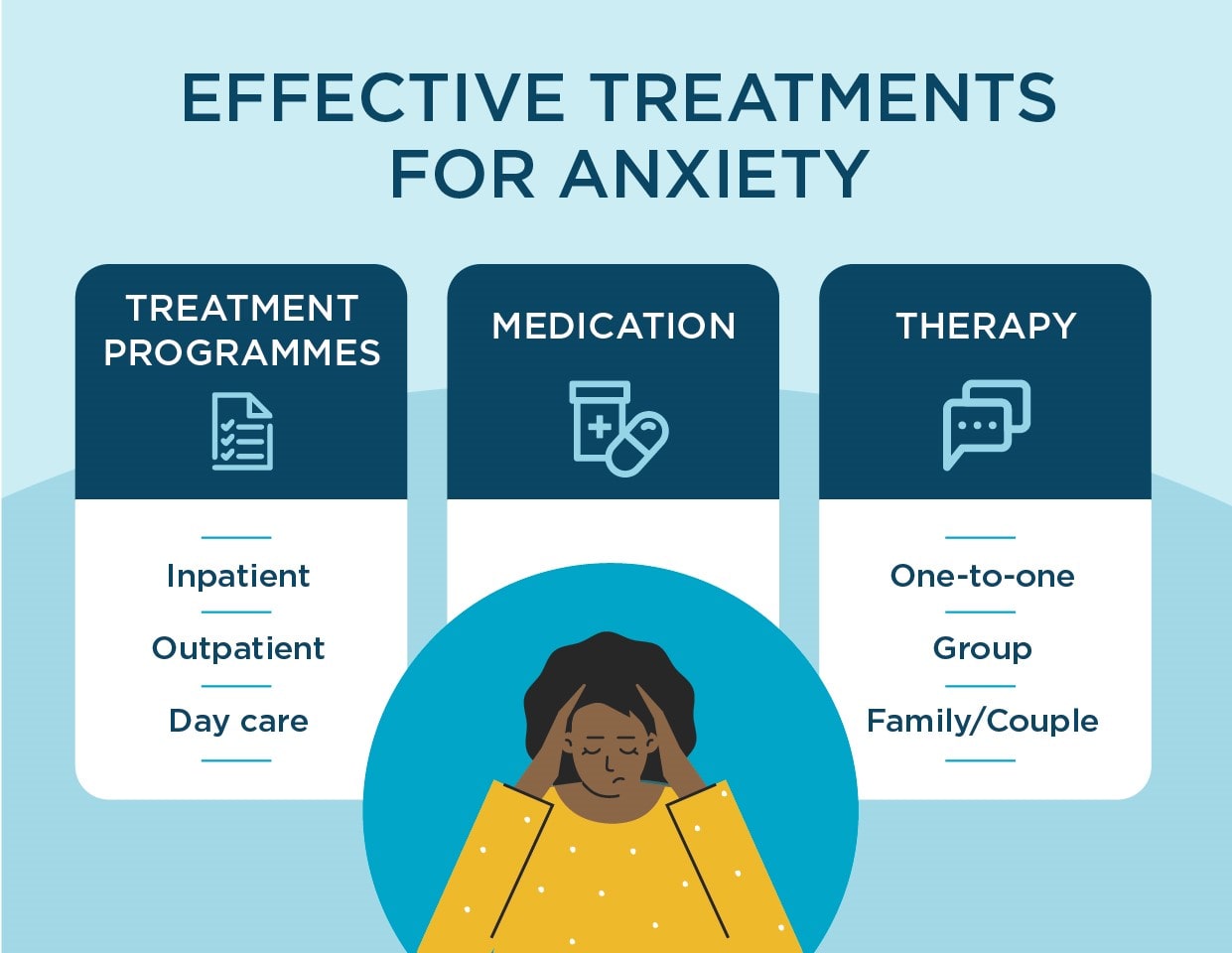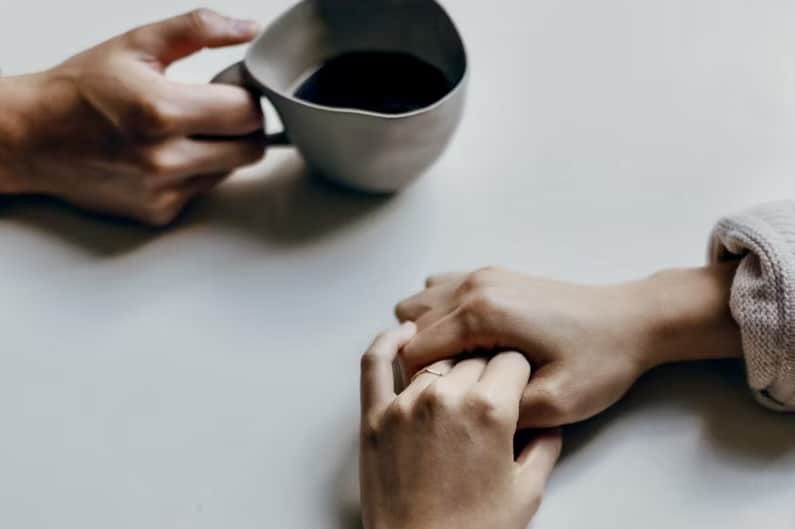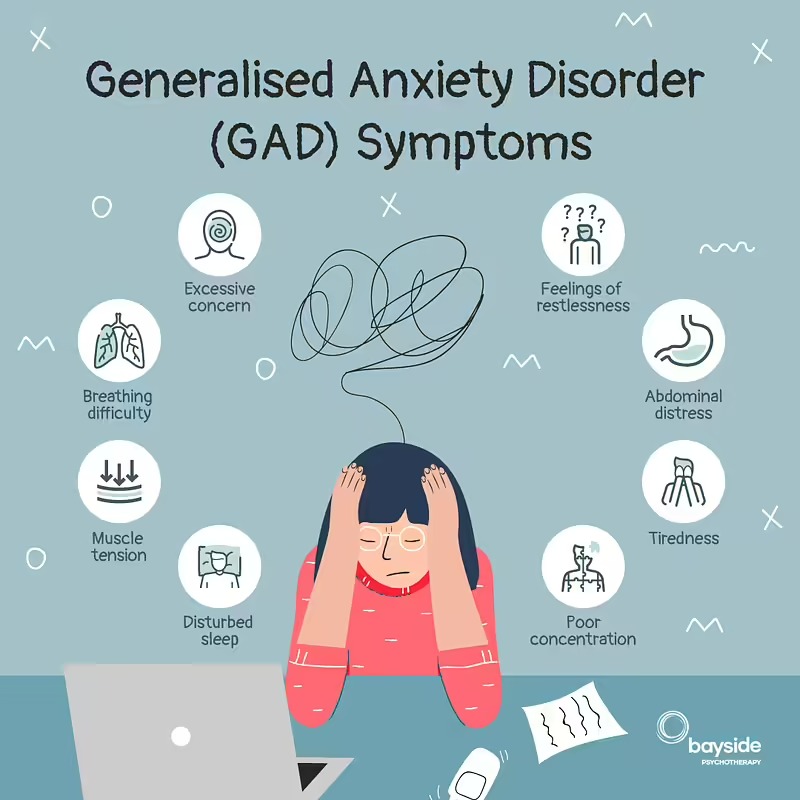Checking Out Various Methods in Counselling for Stress And Anxiety Condition for Enduring Change
When tackling anxiety disorders, it's necessary to check out a variety of therapy methods. Each approach offers distinct understandings and devices to aid you manage your symptoms properly. You might discover that combining techniques can yield the very best outcomes. Recognizing the subtleties of these techniques is essential to fostering lasting adjustment. Suppose the appropriate mix could release a brand-new level of emotional wellness for you?
Comprehending Stress And Anxiety Conditions: A Short Review
Anxiousness disorders, which influence countless people worldwide, can greatly affect daily life. You could experience overwhelming sensations of anxiety or stress that seem irrepressible. These feelings can lead to physical signs and symptoms like an auto racing heart, sweating, or even wooziness. Usual kinds of stress and anxiety disorders consist of generalised anxiousness condition, panic attack, and social stress and anxiety problem. Each has one-of-a-kind indications, yet they all share a tendency to interrupt your routine and relationships.Understanding the source of your stress and anxiety is essential. It might stem from genes, mind chemistry, or life experiences. Recognizing your triggers can help you handle your feedbacks better. It is necessary to bear in mind that you're not alone in this battle. Several individuals face comparable obstacles, and seeking assistance is a strong action toward feeling better. By finding out about anxiousness problems, you're already on the course to understanding and managing your condition more effectively.
Cognitive-Behavioral Therapy: Testing Unfavorable Idea Patterns
In Cognitive-Behavioral Treatment, you'll begin by identifying the negative thought sets off that contribute to your anxiety. You'll function on changing them with even more favorable choices once you recognize these thoughts. Together, you'll construct efficient coping approaches to aid handle your anxiousness in day-to-day situations.
Identifying Negative Thought Triggers

Identifying the details triggers behind your adverse thoughts can be essential in handling anxiousness when you run into minutes of distress. Begin by focusing on scenarios that provoke sensations of concern or worry. Is it a jampacked area, an upcoming target date, or a discussion with particular individuals? Take down these instances in a journal. This will help you identify patterns in your reasoning. Additionally, notification physical experiences that accompany your unfavorable thoughts, like an auto racing heart or rigidity in your upper body. By determining these triggers, you acquire understanding right into what's fueling your anxiety. Understanding these connections is the initial action in challenging those thoughts and ultimately regaining control over your psychological reactions.
Changing Ideas With Positives
Challenging adverse idea patterns is an important action in transforming your way of thinking and lowering anxiety. You might usually find on your own trapped in cycles of insecurity or tragic thinking. Rather than letting these ideas determine your sensations, practice changing them with favorable affirmations or reasonable options. For example, when you think, "I can't handle this," shift it to, "I can handle obstacles one step at a time." This basic adjustment can greatly influence your emotion. Consistently identifying and countering these adverse ideas helps create a much healthier inner discussion. Keep in mind, it takes some time and initiative, yet consistently practicing this method can result in long lasting modification, encouraging you to encounter anxiousness with restored confidence and resilience.
Building Coping Methods With Each Other
Changing adverse ideas is only the beginning of handling stress and anxiety effectively. To create long lasting change, you need to construct coping strategies that empower you. Cognitive-Behavioral Therapy (CBT) assists you determine and test those unhelpful idea patterns. With each other, you and your therapist can explore just how these thoughts impact your sensations and behaviors.Start by creating functional methods, like journaling or mindfulness exercises, that enable you to confront anxiety head-on. When you face your concerns slowly, you'll learn to react differently.

Mindfulness and Acceptance-Based Approaches: Cultivating Present-Moment Recognition
As you navigate the intricacies of anxiousness, incorporating mindfulness and acceptance-based strategies can considerably boost your ability to grow present-moment awareness. By concentrating on the here and currently, you'll locate that you can observe your thoughts and feelings without judgment (Counseling services for anxiety). This practice assists you acknowledge your stress and anxiety without really feeling bewildered by it.Engaging in mindfulness exercises, such as deep breathing, body scans, or led meditations, enables you to ground on your own in your existing experience. Acceptance-based strategies urge you to welcome your emotions as opposed to battle versus them. They shed their power over you.Incorporating these practices right into your daily routine can transform exactly how you respond to anxiousness when you accept your feelings. You'll establish strength and find out to browse see this website demanding situations with higher simplicity. Eventually, growing present-moment awareness lays the structure for long-term modification, equipping you to lead a much more fulfilling life
Exposure Treatment: Challenging Anxieties Progressively
Direct exposure treatment aids you challenge your anxieties in a gradual means, making it much less overwhelming. You'll learn techniques to deal with anxiety-provoking circumstances step by step, while also constructing coping techniques to manage your responses. This strategy encourages you to take control and reduce anxiety in time.
Steady Exposure Strategies

When facing anxiousness, progressively facing your fears can be an effective way to gain back control. This technique, referred to as progressive exposure, includes gradually revealing yourself to the scenarios or items that cause your stress and anxiety. Start with less intimidating scenarios and slowly function your way approximately more tough ones. If you're terrified of public speaking, you may begin by speaking in front of a mirror, then proceed to sharing thoughts with a friend, and ultimately attend to a tiny group. Each action aids desensitize you to the worry, developing your self-confidence gradually. Remember, it's crucial to pace yourself and commemorate small victories as you move with this procedure, enhancing your ability to handle anxiety successfully.
Building Coping Methods
Structure efficient coping approaches is important for managing stress and anxiety, particularly as you challenge your fears slowly - Counseling services for anxiety. One effective approach is direct exposure treatment, where you start by facing your concerns in a regulated fashion. Start with less daunting circumstances and gradually work your way up to even more tough circumstances. This steady direct exposure aids desensitize you to anxiety sets off, making them less overwhelming.Incorporate relaxation techniques, such as deep breathing or mindfulness, to soothe your mind throughout direct exposure. Track your progression, celebrating small success in the process to boost your confidence. Keep in mind, it's fine to take your time; the objective isn't perfection linked here however steady improvement. By developing these methods, you'll empower yourself to navigate anxiousness and embrace life much more totally
Psychodynamic Therapy: Revealing Root Reasons of Anxiety
Psychodynamic therapy discovers the unconscious mind, exposing the origin triggers of your anxiousness. By examining your thoughts, feelings, and past experiences, this approach aids you discover underlying problems and unsettled concerns that may add to your existing anxiousness. You'll collaborate with a specialist to investigate youth experiences, relationships, and emotional patterns that shape your reactions today.As you acquire understanding right into these much deeper layers of your mind, you'll begin to recognize just how past occasions influence your existing behavior. This understanding can lead to catharsis, permitting you to process feelings you may have suppressed.Through the restorative partnership, you can likewise recognize defense systems that may have developed gradually, providing a clearer path to transform. Eventually, psychodynamic therapy equips you with the devices to address your stress and anxiety at its core, promoting lasting transformation in your emotional well-being.
Alternative and integrative Methods: Incorporating Methods for Greater Efficacy
Incorporating numerous healing methods can boost your journey toward managing stress and anxiety much more effectively. By incorporating elements from cognitive-behavioral therapy, mindfulness techniques, and alternative strategies, you can produce an individualized approach that resolves your unique requirements. For example, you could make use of cognitive-behavioral methods to challenge adverse idea patterns while integrating mindfulness workouts to ground yourself in today moment.Additionally, exploring holistic techniques such as yoga or meditation can advertise relaxation and decrease anxiousness signs and symptoms. This mix allows you to develop higher self-awareness and resilience.Experimenting with these varied techniques can help you discover what resonates most with you. Keep in mind, it has to do with discovering a harmony that works, as opposed to adhering to a single strategy. This integrative strategy not only provides immediate relief but likewise promotes lasting abilities for managing anxiousness, encouraging you to reclaim control over your life.
The Role of Support Systems: Building Resilience Via Connection
While it could seem that handling anxiety is a solitary trip, having a strong assistance system can play a necessary function in your durability. see this Bordering yourself with understanding pals, family, or support teams develops a risk-free area where you can openly share your feelings and experiences. When you connect with others, you advise yourself that you're not alone in this struggle.These connections offer motivation and can provide sensible coping methods that have worked for others. It's also a possibility to gain point of view; pals can aid you see situations in a different way, reducing feelings of isolation.Moreover, psychological support promotes a feeling of belonging, which can greatly reduce anxiousness signs. By leaning on your assistance system, you can build resilience and deal with challenges a lot more effectively. Keep in mind, connecting for assistance signifies strength, and it can make all the distinction in your journey towards handling anxiousness.
Often Asked Concerns
What Are the Common Signs And Symptoms of Anxiety Disorders?
You might experience uneasyness, exhaustion, problem focusing, irritability, muscle mass tension, and sleep disruptions. Physical symptoms can include quick heart beat, sweating, and shivering. Recognizing these indicators early can help you look for appropriate support and treatment.
The Length Of Time Does Therapy Typically Last for Stress And Anxiety Conditions?
Therapy for anxiety disorders typically lasts anywhere from a few weeks to a number of months. It truly depends upon your individual needs, progression, and the strategies your specialist utilizes to help you handle your anxiousness efficiently.
Can Medication Be Used Along With Treatment for Stress and anxiety?
Yes, drug can most definitely be made use of together with therapy for anxiousness. Integrating both approaches commonly enhances treatment performance, aiding you take care of signs while exploring underlying concerns with therapy (Counseling services for anxiety). Constantly consult your doctor for individualized guidance
Exist Self-Help Methods for Handling Anxiety?
Yes, there are a number of self-help strategies for taking care of anxiety. You can exercise mindfulness, participate in normal exercise, keep a balanced diet, develop a routine, and make use of deep breathing techniques to aid decrease stress and anxiety signs successfully.
How Do I Know if I Need Specialist Assistance for Stress And Anxiety?
